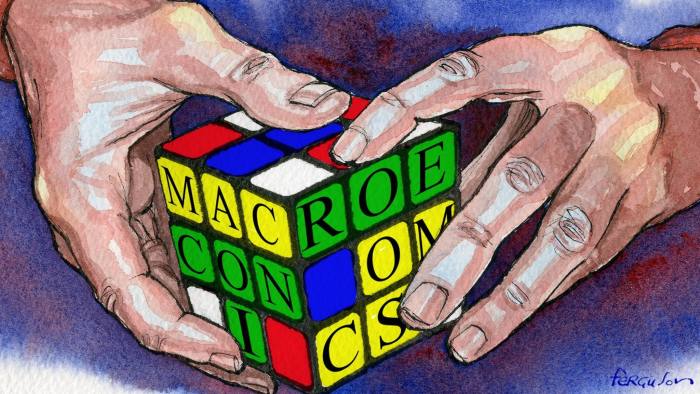Economics is, like medicine (and unlike, say, cosmology), a practical discipline. Its goal is to make the world a better place. This is particularly true of macroeconomics, which was invented by John Maynard Keynes in response to the Great Depression. The tests of this discipline are whether its adepts understand what might go wrong in the economy and how to put it right. When the financial crisis that hit in 2007 caught the profession almost completely unawares, it failed the first of these tests. It did better on the second. Nevertheless, it needs rebuilding.
经济学是一门实用学科,与医学一样,而与(比如说)宇宙学不一样。经济学的目的是让这个世界变得更美好。宏观经济学尤其如此,它由约翰?梅纳德?凯恩斯(John Maynard Keynes)在对大萧条(Great Depression)做出回应时所创。对这门学科的检验在于,宏观经济学专家是否了解经济中哪里可能出问题以及如何纠正。2007年爆发的金融危机几乎让该学科完全始料不及,第一次检验不及格。第二次的成绩好一些。但它需要重建。
In a blog for the Financial Times in 2009, Willem Buiter, now at Citi, argued that: “Most mainstream macroeconomic theoretical innovations since the 1970s?.?.?.?have turned out to be self-referential, inward-looking distractions at best.” An exceptionally thorough analysis, published in the Oxford Review of Economic Policy, under the title “Rebuilding Macroeconomic Theory”, leads this reader to much the same position. The canonical approach did indeed prove gravely defective. Moreover, top class professional economists differ profoundly on what to do about it. Socrates might say that awareness of one’s ignorance is far better than the illusion of knowledge. If so, macroeconomics is in good shape.
在2009年为英国《金融时报》撰写的博客中,现供职于花旗(Citi)的威廉姆?比特(Willem Buiter)指出:“自上世纪70年代以来的多数主流宏观经济理论创新……被证明充其量是自我参照、封闭的消遣。”发表在《牛津经济政策评论》(Oxford Review of Economic Policy)的一篇非常深入的分析文章题目为“重建宏观经济理论”,它引导读者得出大致相同的观点。墨守成规的研究方法确实被证明存在严重缺陷。另外,顶尖职业经济学家对于如何解决这个问题存在深刻分歧。苏格拉底(Socrates)可能会说,意识到自己的愚昧无知要比处于知识幻觉好得多。如果是这样的话,宏观经济学目前状况良好。
As David Vines and Samuel Wills explain in their excellent overview, the core macroeconomic model rested on two critical assumptions: the efficient markets hypothesis and rational expectations. Neither looks convincing today. It is questionable whether it is even possible to have “rational expectations” of a profoundly uncertain future. Such uncertainty helps explain the existence of institutions — money, debt and banks — whose effects are so significant and yet were largely ignored in standard models. It is better to be roughly right than precisely wrong. Thus, Hyman Minsky’s view of the dangers of speculative tendencies in finance was roughly right, while many of the brightest macroeconomists proved precisely wrong.
正如大卫?维内斯(David Vines)和萨姆?威利斯(Sam Willis)在二人精彩的概述中解释的那样,核心宏观经济模型取决于两个重要假设:有效市场假说和理性预期。这两点现在看上去都没有说服力。对高度不确定的未来是否有可能有“理性预期”甚至都存在疑问。这种不确定性有助于解释货币、债务和银行等体系的存在,这些体系的影响非常重要,但在标准模型中基本被忽视。大致正确好于完全错误。海曼?明斯基(Hyman Minsky)有关金融领域投机倾向危险性的观点大致正确,而很多最聪明的宏观经济学家被证明是完全错误的。
It is not good enough to argue that the canonical model works in normal times. We need also to understand the risks of crises and what to do about them. This is partly because crises are, as the Nobel-laureate Joseph Stiglitz notes, the most costly events. A macroeconomics that does not include the possibility of crises misses the essential, just as would a medicine that assumes away the possibility of heart attacks. Moreover, crises are endogenous: that is to say, they come from within the economy. They are a result of the interaction between tendencies towards excessive optimism and the fragility of any system of highly leveraged financial intermediaries.
辩称标准模型在常规时期有用是不够的。我们还需要了解危机的风险以及如何应对。这在一定程度上是因为危机是代价最高的事件,正如诺贝尔奖得主约瑟夫?斯蒂格利茨(Joseph Stiglitz)指出的那样。不包括危机可能性的宏观经济学没有抓住重点,就好像一种药物不假设出现心脏病的可能性。另外,危机是有内源性的:这就是说,它们来自经济内部。它们是过分乐观的倾向以及高杠杆金融中介体系的脆弱之间相互作用的结果。
My colleague Martin Sandbu notes, in particular, the possibility of “multiple equilibria” — the idea that economies might end up in self-reinforcing bad states of the world. This possibility makes it vital to respond to crises forcefully. Doctors’ first response to a heart attack is, after all, not to tell the patient to go on a diet. That happens only after they have dealt with the attack itself.
我的同事马丁?桑德布(Martin Sandbu)特别指出“多重均衡”的可能性,这种观点认为,经济可能最终会让全球的糟糕状态自我强化。这种可能性让对危机做出有力应对变得至关重要。毕竟,医生面对心脏病的第一反应不是告诉患者要节食。这种事情只有在他们处理过心脏病后才会发生。
So a big question is not only whether we know how to respond to a crisis, but whether we did so. In his contribution, the Nobel laureate Paul Krugman argues, to my mind persuasively, that the basic Keynesian remedies — a strong fiscal and monetary response — remain right. Also vital is swift revitalisation of the banking system. The contrast between the swifter US recovery and the dreadful delays in the eurozone gives striking support for this view. Essentially, the latter lost five years before the recovery began.
因此,重要问题不仅是我们是否明白如何应对一场危机,还有我们是否这么做了。诺贝尔奖得主保罗?克鲁格曼(Paul Krugman)指出(我认为很有说服力),凯恩斯的基本补救方法——强有力的财政和货币应对措施——仍然正确。同样重要的还有银行体系快速恢复活力。美国经济更快复苏与欧元区经济复苏的可怕延迟之间的对比,为这种观点提供了明显支持。基本上,欧元区失去了5年才开始复苏。
A comparison between what happened in the 1930s and this post-crash period shows we have indeed learnt some important things. Compared with the Great Depression, the immediate declines in output and rises in unemployment were far smaller. Moreover, prices have also been far more stable this time. These are true successes. Nevertheless, after a decade, the level of output per head, relative to pre-crisis levels, is less impressive: Germany and the UK did even better last time. Moreover, the worst hit eurozone countries have suffered badly, by any standards. This recovery really has not been a triumph.
比较一下上世纪30年代和此次危机之后的时期,我们会发现,我们实际上学到了一些重要的东西。与“大萧条”相比,产出的立即下滑以及失业率上升幅度要小得多。另外,这次物价也一直稳定得多。这些是真正的成功。然而,在危机发生了10年后,相对于危机前的人均产出水平则不如人意:德国和英国甚至上一次表现得更好。另外,以任何标准来衡量,遭受最严重打击的欧元区国家都受损严重。这次复苏实际上算不上成功。
This suggests that fixing a huge crisis after the event is terribly hard. The obvious need then is to make economies more resilient. Even if we do not fully understand the economic dynamics, the broad lessons for the reform of our economies seem clear. Economies would be more resilient if they were less highly leveraged and, in particular, if they depended less on holdings of money backed by risky assets owned by the highly leveraged financial intermediaries known as banks. Obvious solutions include eliminating the incentives towards leverage in our tax systems, encouraging greater use by the economy of equity finance and debt that can be readily converted into equity, raising the reserve and capital requirements of banks and moving swiftly towards the issuance of digital central bank cash.
这表明,事后修复一场严重危机非常困难。因此,明显有必要让经济变得更有韧性。尽管我们不完全了解经济运行动态,但该如何改革经济的普遍教训似乎是显而易见的。如果杠杆不那么高,尤其是如果减少对高杠杆金融中介机构(即银行)所有的风险资产支持的资金的依赖,经济的韧性将会增强。显而易见的解决方案包括消除我们税收体系中鼓励使用杠杆的激励措施、鼓励扩大经济对股权融资以及可轻易转换为股权的债务的使用、提高银行的准备金和资本金要求、以及快速转向发行央行数字货币。

The analysis of fundamental macroeconomic theory suggests substantial ignorance of how our economies work. This is not that surprising. We may never understand how such complex systems — animated, as they are, by human desires and misunderstandings — actually function. This does not mean that attempting to improve understanding is a foolish exercise. On the contrary, it is important. But it is arguably more vital in practice to focus on two other tasks. The first is how to make the body economic more resistant to the consequences of manias and panics. The second is how to restore it to health as quickly as possible. On both counts, we need to think more and do more. These are the practical challenges before us.
对基本宏观经济理论的分析显示,我们经济的运行方式被极大地忽视了。这并不那么令人意外。我们可能永远不理解这些复杂的体系(由人类欲望和误解驱动)实际上如何运转。这并不意味着努力提高认识是愚蠢之举。相反,这很重要。但实际上,关注另外两个任务或许更为重要。第一个是如何让经济更能抵御狂热和恐慌的影响。第二个是如何尽可能快地令其恢复健康。从这两方面来看,我们需要思考更多并采取更多行动。这些是我们面临的实际挑战。













